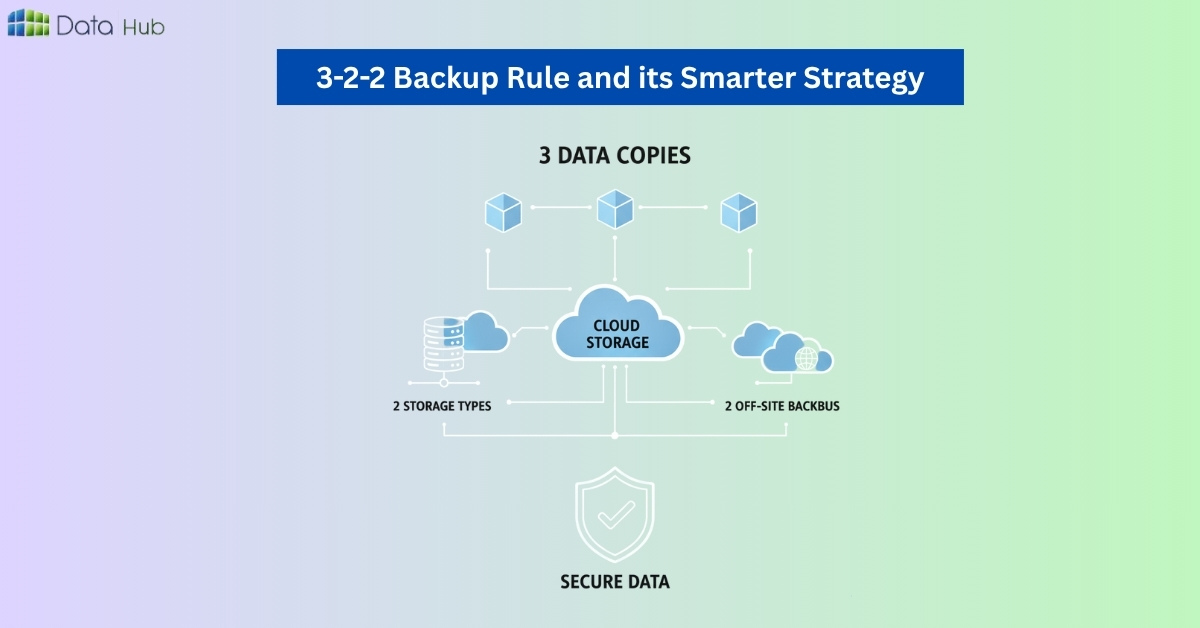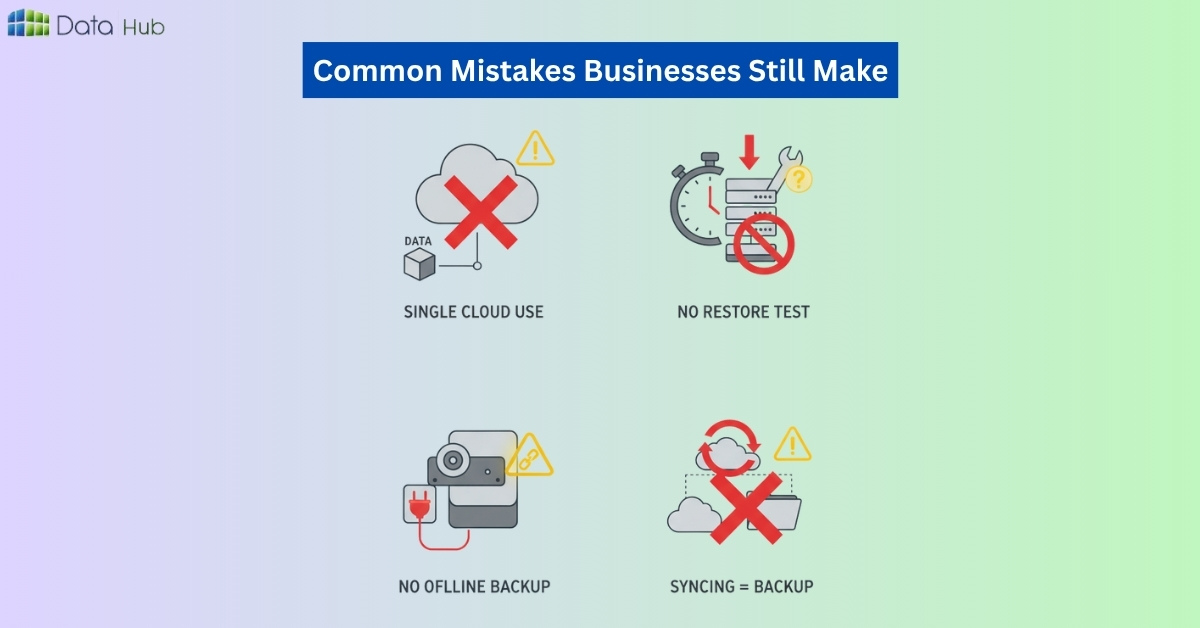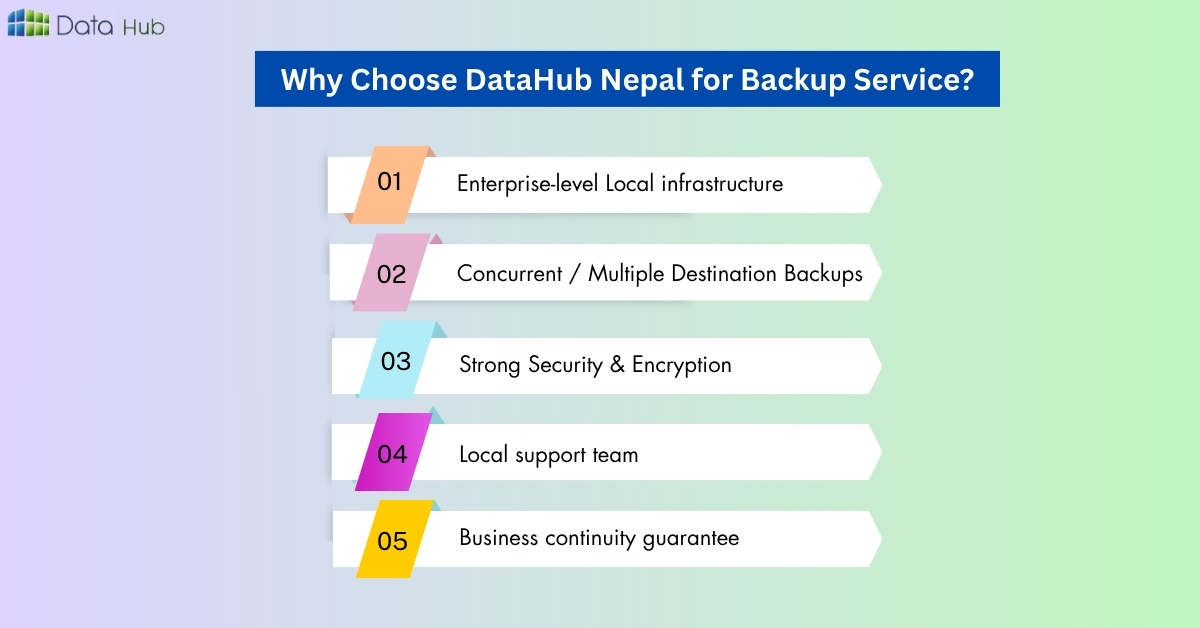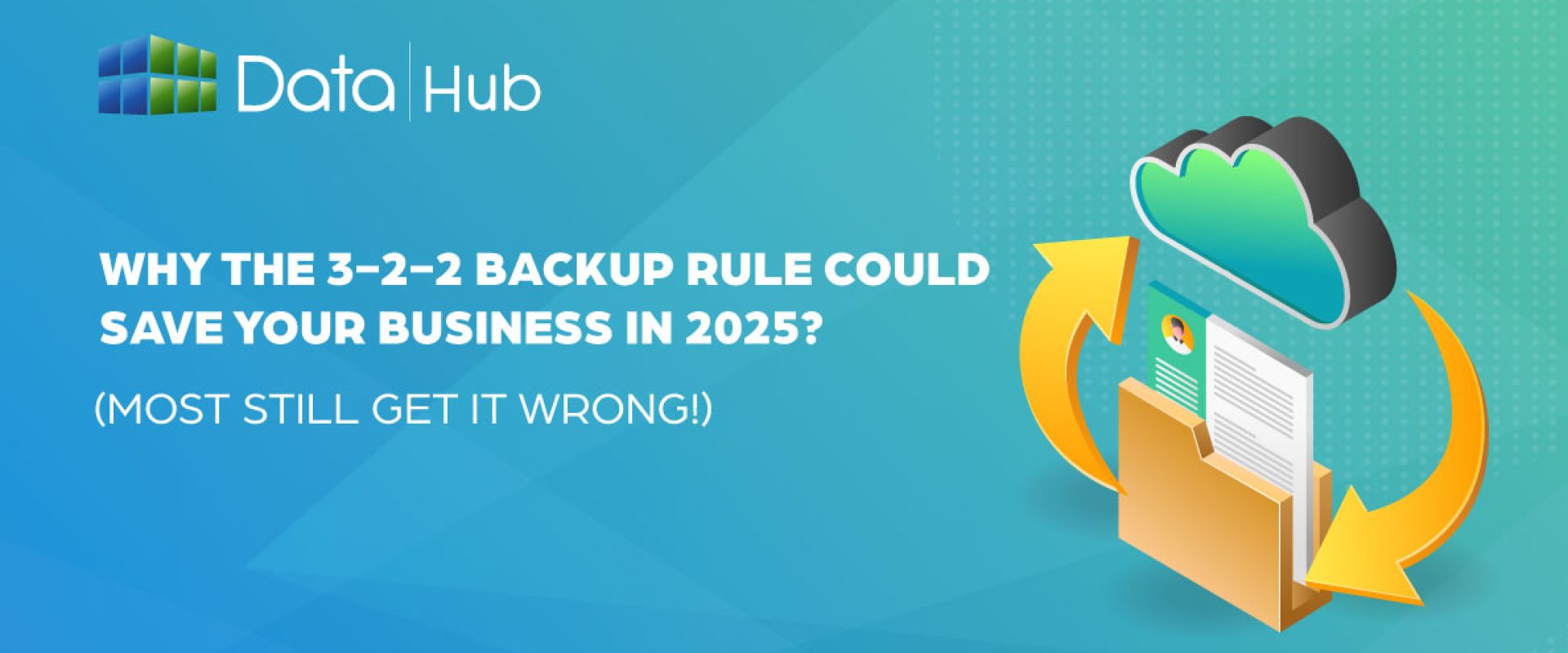In 2026, the biggest threat to businesses, whether startups or large enterprises, is not competition. It’s data loss.
Every day, businesses across Nepal and the world lose critical data to accidental deletions, ransomware attacks, hardware failures, or server crashes.
Unfortunately, most businesses only realize the importance of backups after losing irreplaceable data
Even a few minutes of downtime can cost a business lost sales, broken workflows, and damaged reputation losses no modern organization can afford..
That’s where the 3-2-2 Backup Rule comes in a smarter, modern approach that keeps your data protected under any circumstance.
You will find out in this guide what the 3 2 2 rule is, why it is gaining ground as the global one in 2026, and how DataHub Nepal facilitates its adoption by businesses all over the country without much trouble.
Table of contents
- Why Data Backup Matters?
- What Is a Data Backup?
- What Is the 3-2-2 Backup Rule and Why It’s the Smarter Strategy?
- 3-2-2 vs. 3-2-1: Why Businesses Must Upgrade?
- What Happens When Businesses Don’t Back Up Properly?
- How Cloud and Hybrid Environments Changed Backup in 2026?
- Pros and Cons of Backup Methods (in Simple Points)
- Implementing the 3-2-2 Rule
- Common Mistakes Businesses Still Make
- Why Choose DataHub Nepal for Backup Service?
- Conclusion
- FAQs
Why Data Backup Matters?
Nepal’s digital ecosystem is rapidly expanding, not just in fintech and e-commerce, but also across IT firms, NGOs, and government sectors.
This expansion leads to a continuous increase in reliance on digital information.
Nevertheless, additional information is associated with increased risk.
Ordinarily, business data loss in Nepal in 2026 is caused by:
- Power failures or server failures at the local level.
- Ransomware attacks targeting small businesses
- Human errors, such as deletions by error.
- Physical losses due to floods, fire, or other natural calamities.
- Cloud misconfigurations, which reveal or destroy data.
Nevertheless, with such threats, most Nepali companies use single cloud backup or simple hard-drive storage, assuming it is good enough. Unfortunately, that’s a major mistake.
What Is a Data Backup?
Data backup simply means creating copies of your important files and systems, so they can be restored if the originals are lost or damaged.
But not all backups are created equally.
The real difference lies in how many copies you keep, where you store them, and how easily you can recover them.
That’s why IT experts and data protection professionals now recommend upgrading the old 3-2-1 rule to the more reliable 3-2-2 backup rule built for the hybrid, cloud-based business environments of 2026.
What Is the 3-2-2 Backup Rule and Why It’s the Smarter Strategy?
The 3-2-2 Backup Rule is a simple yet powerful framework designed to eliminate single points of failure. Here’s how it works:
A. 3 Copies of Your Data
One primary (live) copy and two backup copies.
This ensures redundancy even if one backup fails, another exists.
B. Different Storage Types
Use different media, such as cloud storage and local servers, or hard drives and NAS devices.
This prevents a single point of failure.
C. 2 Offsite or Offline Backups
Keep one copy offsite in a secure data center such as DataHub Nepal, and another completely offline like a disconnected external drive for maximum protection.
This safeguards against both cyberattacks and local disasters.
In short:
Even if your office server crashes or a ransomware attack encrypts everything, your data remains safe in at least two other locations, one cloud-based and one offline.

3-2-2 vs. 3-2-1: Why Businesses Must Upgrade?
While the classic 3-2-1 rule (3 copies, 2 types, 1 offsite) worked well in the past, evolving cyber threats and hybrid IT environments demand a stronger safeguard.
Here’s why 3-2-2 wins in 2026:
- Extra layer of protection: Two off-site copies mean one can be offline (safe from ransomware).
- Faster recovery: One offsite cloud backup for speed, one offline for absolute safety.
- Resilience against modern threats: Works perfectly for hybrid setups (cloud + physical).
- Better business continuity: Keeps you operational even during large-scale outages.
What Happens When Businesses Don’t Back Up Properly?
Here’s what many organizations in Nepal experience when they skip proper backup strategies:
- Downtime lasting days or weeks after a cyberattack
- Permanent data loss from failed hard drives
- Skyrocketing recovery costs
- Breach of client trust and compliance issues
A single data loss incident can cost lakhs in revenue along with lasting damage to reputation, compliance, and productivity.
How Cloud and Hybrid Environments Changed Backup in 2026?
In 2026, most Nepali businesses operate in hybrid environments combining on-premises infrastructure with public or private cloud systems.
While cloud backup is convenient, relying on a single provider introduces new risks like vendor outages, security breaches, and sync errors.
Why?
- Cloud services can also face downtime or security breaches.
- Sync errors or misconfigurations can delete files across all connected systems.
- Ransomware can synced cloud storage.
That’s why DataHub Nepal’s hybrid cloud and data center solutions are trusted, giving you full control, physical security, and local support while still integrating with global cloud tools.
Pros and Cons of Backup Methods (in Simple Points)
1. Local Backup (Hard Drives, NAS):
Pros:
- Fast access
- Full control
Cons:
- Vulnerable to physical damage
- Not secure against ransomware
2. Cloud Backup:
Pros:
- Accessible anywhere
- Automates sync and updates
Cons:
May be hacked if not configured properly
Requires stable internet
3. Offline or Data Center Backup:
Pros:
Immune to online attacks
Physically secure and managed
Cons:
Needs routine maintenance
Slightly slower to restore
Therefore 3-2-2 rule comes in by combining all three: balancing speed, safety, and reliability.
Implementing the 3-2-2 Rule
Step-by-Step Implementation
The 3 2 2 rule can be used in your business in 2026 in this way:
Determine vital information: databases, emails, financial systems, and documents.
Formulate three copies, that is, one active copy and two backups.
Use two types of storage, one on physical NAS and the other on the cloud.
Have two off-site or offline backups, one at a DataHub Nepal data center, and another in an offline device.
Automate your backups to minimize human error and ensure consistency.
Test recovery regularly to ensure data can be restored when needed.
Review and update your backup policies every quarter to stay aligned with new risks and technologies.
Best Practices for Reliable Backup
- Automate backups: Use scheduled or continuous backup systems.
- Encrypt data: Always protect sensitive files.
- Mix cloud + offline: Combine convenience and security.
- Test restores monthly: A backup that can’t be restored is useless.
- Use trusted partners: Choose local experts like DataHub Nepal for 24/7 support.
Common Mistakes Businesses Still Make
Even in 2026, many businesses in Nepal continue to make the same data protection mistakes, often without realizing the risk until disaster strikes. Here are the most common ones:
- Relying on a single cloud platform: Many assume that storing files in one cloud provider is enough. But if your account is hacked or data is accidentally deleted, everything can vanish instantly.
- Not testing data restores: Backups are useless if they can’t be restored. Businesses rarely check whether their backup systems actually work until a crisis hits, when it’s too late.
- Keeping all backups in one location: If a fire, flood, or power surge hits your office or data center, every copy could be lost together.
- Ignoring offline or off-site backups: Online backups alone can still be compromised by ransomware or human error. Offline backups add an extra layer of defense.
- Confusing syncing with real backup: Sync tools mirror changes, meaning if one file is corrupted or deleted, it’s lost across all synced locations.
Avoiding these pitfalls starts with adopting a proven, modern framework like the 3-2-2 backup rule, which ensures your data is always protected, recoverable, and safe from both online and offline threats.

Why Choose DataHub Nepal for Backup Service?
DataHub Nepal is a reputable company specializing in data center and cloud services, which assists businesses of all types in preserving their most valuable asset: data.
The differentiator of DataHub Nepal is as follows:
- Enterprise-level Local infrastructure: Tier-III certified data centers ensuring high uptime, redundancy, and strong physical security.
- Safe cloud backup services: Cloud backup is encrypted, scalable, and Nepali business optimized.
- Disaster recovery experience: Restore systems fast whenever they are disrupted.
- Local support team: 24 /7 surveillance and technical support.
- Business continuity guarantee: Keep operations running smoothly even during unforeseen outages or cyber incidents.
Startups, IT companies, or government departments, DataHub Nepal offers them the stability and scalability they require to be completely at ease.

Conclusion
In 2026, data is more than just digital information; it’s the foundation of every decision, transaction, and customer relationship your business depends on.
Yet, many organizations still underestimate the true cost of data loss until it’s too late.
A single hardware failure, cyberattack, or accidental deletion can erase months, even years of hard work in seconds.
Adopting the 3-2-2 Backup Rule isn’t just a smart choice, it’s essential for long-term business resilience and digital continuity.
By keeping multiple copies across diverse storage types and secure off-site locations, you ensure that your data remains recoverable under any circumstances.
Partnering with DataHub Nepal means your backups aren’t just safe, they’re professionally managed, encrypted, and always accessible when you need them most.
Whether you’re running a startup or scaling an enterprise, proactive data protection today guarantees stability, trust, and business continuity tomorrow.
Safeguard your business future start your 3-2-2 Backup Strategy with DataHub Nepal today and ensure uninterrupted data protection for 2026 and beyond.
FAQs
It is a contemporary backup plan that retains three replicas of your documents, applies to two distinct varieties of storage, and stores two replicas offline or off-site to be as safe as possible.
The 3-2-2 rule adds one more off-site or offline backup, offering stronger protection against ransomware and system failures.
Due to the increase in natural disasters, power outages, and cyber threats, and the inability to recover without backups, it is close to impossible.
No. Cloud backup is convenient, but it can be vulnerable to hacking or syncing errors. Always combine it with offline or off-site backups.
Any type of data, in particular, SMEs, IT companies, fintech companies, and online retailers dealing with sensitive customer or operational information.
At least daily for critical systems, and weekly for less important files. Automation can help maintain consistency.
DataHub Nepal offers secure cloud storage, off-site backup, and disaster recovery services tailored for local businesses with expert support.
Yes. DataHub Nepal helps companies to adopt automated and scheduled backups that enable round-the-clock protection.
If you follow the 3-2-2 rule, you’ll have clean, recoverable copies stored safely offsite or offline, ready to restore anytime.
Simply contact DataHub Nepal to schedule a free consultation and design your ideal business backup and recovery plan.


